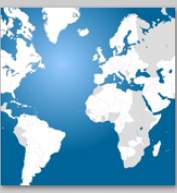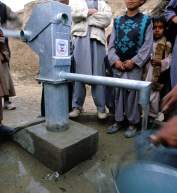Speeches
Haleh described my official title as Deputy Administrator, and that’s what it says on the website. I help provide overall direction and management for the Agency, with an emphasis on the Middle East and Africa, oversee implementation of USAID Forward and advancement of presidential initiatives such as food security, global health, climate change, and democracy and governance. But in this small intimate environment –webcast throughout the world—I’m going to let you in on a little secret.
My real day job is to ensure that all our development efforts are implemented in an inclusive manner, in particular drawing on the contributions of previously marginalized and disempowered groups, whether that is women, people with disabilities, indigenous groups, youth, the LGBT community, and religious and ethnic minorities. They must be at the center of our work, and they must be planners, implementers and beneficiaries of all of our development efforts. We have a watchword we use at USAID, “Nothing about them without them.”
Today’s action plan is an unprecedented approach to coordinate the efforts of more than 30 government offices within seven agencies in 100 countries and to unite them with a common purpose, with three core objectives: Every child survives and gets healthy food, Every child grows up in the protective and nurturing embrace of a family, and Every child is safe from violence and exploitation.
We’ve always known that achieving these goals is within our power, but today—for the first time—we have a real, evidence-based, results-oriented plan to get us there. It is a plan that doesn’t just describe our aspirations, but outlines specific and achievable outcomes we must deliver. And it is a plan that doesn’t just describe the challenges we face, but cites specific scientific studies that underpin our learning and inform our new approaches.
Mexico and the United States have a shared border, a shared history, and, increasingly, a shared road to prosperity based on partnership between our two peoples. When they met in Washington in late November, President Obama and President Peña Nieto articulated a common vision that puts even closer economic integration and prosperity at the forefront of the U.S.-Mexico relationship. My visit and the program we are launching today are a tangible reflection of this.
The demand for justice and security is what brings us here today. In Guatemala and other Central American countries, the United States has long emphasized the importance of institutional capacity building. Today is an opportunity to reaffirm our partnership with Guatemala to improve citizen security and bolster the rule of law.
The USAID Security and Justice Sector Reform Project works hand-in-hand with the Supreme Court, the Ministry of Governance, the Public Ministry, the Institute of Public Defense and the National Forensic Institute to improve internal systems and processes thereby building more effective institutions.
It’s wonderful to come together as the year is winding down and the excitement of the holidays and the New Year is beginning. In preparing for today, I was reflecting on all the reasons we’ve come together over the past few years for townhalls and big events. They’ve been opportunities to celebrate our work, discuss our concerns, and share some innovative ideas for the future.
It is with deep humility and respect that we gather here today to honor one of our own, Ragaei Abdelfattah. To Ragaei’s family—his wife Angela, his two sons Omar and Ali, their mother Heba, and members of his family at home in Cairo—our prayers are with you. We are grateful for the sacrifices you made to support Ragaei in his life’s work. We know it was not easy.
We are honored to be joined by our colleagues from the White House, the Department of Defense, and the State Department, including Under Secretary Patrick Kennedy and Ambassador Linda Thomas-Greenfield. In his devotion to his family and his work, Ragaei represented the very best among us.
It is a solemn occasion as we gather today to honor and remember our friend and colleague, Ragaei Abdelfattah, a beloved member of our USAID family. From what I’ve learned about Ragaei, he would want us here today not only to mourn, but to celebrate. To celebrate his commitment to a better world. To celebrate his devotion to family. To celebrate his enthusiasm for appreciating challenges, then besting them… To celebrate a life well-lived.
Today, we have technologies that can help farmers grow more productive crops and improve water management. The evidence base is growing around a select number of technologies that—if taken to scale—can impact tens of millions of lives. But those technologies are not reaching nearly enough farmers. For example, the main hybrid maize used in Kenya today dates from 1986. And in Ghana, the main open-pollinated maize variety dates from the 1980s. Very promising varieties of stress-tolerant NERICA rice are hardly available in West Africa, where it could benefit millions, and fertilizer use in Africa remains the lowest in the world.
In order to tackle these challenges and help ensure key technologies reach their fullest potential, we have to focus our efforts. We know that technology alone can’t solve all of our problems. We need to be targeted in order to achieve results. The Green Revolution, while remembered for its silver bullets, was infinitely more complex. And with a growing population and challenges like climate change, today’s world is arguably even more so.
As we look to the future of the DAC, we will all have to adapt to a changing international environment. As important as it is, official development assistance (ODA) is no longer the prime source of capital investment for developing countries, and no longer has the principal role in filling savings gaps. For the United States, for example, our ODA this year will total about $30 billion, the world’s largest level by far. And yet private Americans give some $40 billion each year to international relief and development efforts through civil society institutions, faith-based groups, academic institutions and corporate social responsibility. Another $100 billion is sent by American citizens and residents to developing countries in remittances. Equally important, some $1 trillion in investment capital flows from the U.S. to developing countries from all sources each year. Private capital flows have increased seven fold over the past decade.
As a result, we need to consider the new roles that providers of development assistance must fill in the development continuum. We need to use our resources to make strategic investments, targeting the constraints to growth in our partner countries. We need to use our convening authority to bring all parties – including governments, civil society, business, and international financial institutions – to the table. We need to reduce the risk for others, such as private investors and host governments, through innovative insurance schemes and capital investment funds. We need to take calculated risks ourselves where others may fear to tread, always aware that we must be good stewards of taxpayers’ dollars.
We need to help raise voices of all citizens—and empower their governments to respond. That’s the spirit behind today’s launch—to build on President Obama’s call for open government and inspire a global movement to end corruption and strengthen accountability. This Grand Challenge calls on the world’s brightest innovators, entrepreneurs, and engineers to design breakthrough technologies and approaches to make all voices count. In fact, we’ve already seen some cutting-edge examples at work around the world.







Comment
Make a general inquiry or suggest an improvement.